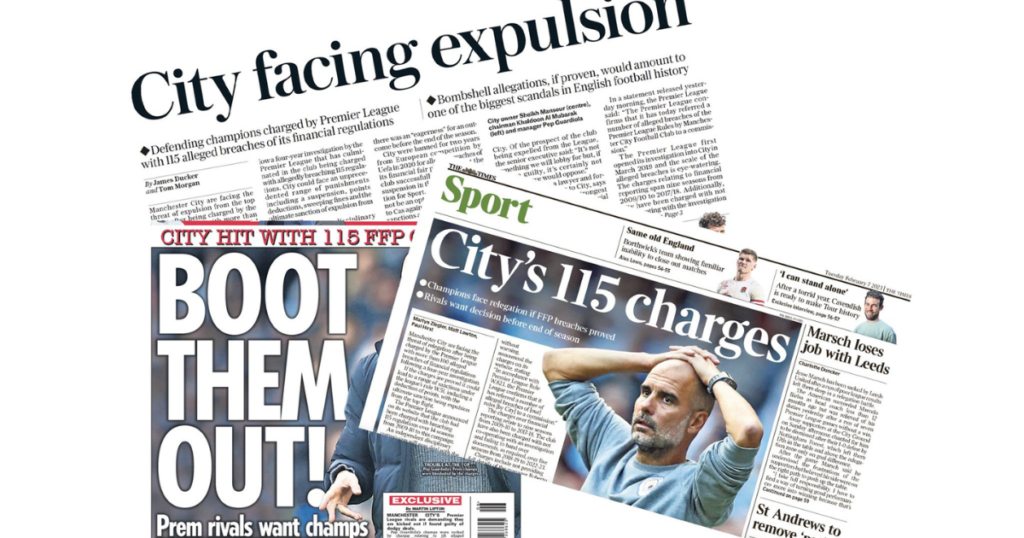One of the top Premier League teams, Manchester City, has recently been involved in a web of allegations and controversies including financial malfeasance. The charges arise from the extravagant support given by Abu Dhabi’s ruling family, headed by Sheikh Mansour bin Zayed Al Nahyan. It changed the club’s history and led to their supremacy in both domestic and international tournaments, including the Champions League and FA Cup.
These claims touch on a number of different topics, such as a sizable sponsorship agreement with Etihad Stadium, off-the-field problems, and the time they had famed manager Pep Guardiola in charge. The Court of Arbitration for Sport’s legal struggle that followed and the UEFA Financial Fair Play regulations at its centre are what really matter.
Historical Context:
Manchester City’s rise to fame and financial security coincided with UEFA’s allegations of financial fair play violations due to their dominance in domestic competitions. However, the Court of Arbitration for Sport reversed some of these allegations, raising doubts about the validity of UEFA’s financial regulations and the impartiality of the commission in handling these matters.
The legal dispute involving Manchester City could significantly alter the football hierarchy, impacting the club’s rebuilding strategy and fan sentiment. The world is closely monitoring the unfolding story, eager to see how it affects the “beautiful game.”
Manchester City’s Rise to Prominence:
Manchester City, once a mid-tier club, transformed with the support of Abu Dhabi’s ruling family, led by Sheikh Mansour bin Zayed Al Nahyan, from a small player to a dominant force in English football, focusing on the Premier League, Champions League, and FA Cup.
Charges Against City:
Manchester City is facing allegations of financial misconduct due to their sponsorship agreements, particularly with Etihad Airways, which led to the renaming of the Etihad Stadium. Critics argue these transactions were artificially inflated, allowing the team to avoid UEFA’s Financial Fair Play regulations.
Legal Battle:
Manchester City denied wrongdoing and contested accusations in court, leading to a legal dispute. The club filed a case with the Court of Arbitration for Sport, which ultimately ruled in City’s favor, reversing their two-year European competition suspension and reducing penalties.
UEFA Rules and Financial Fair Play:
UEFA’s Financial Fair Play regulations aim to ensure responsible financial management and prevent financial instability among clubs, regardless of financial support. The Manchester City incident highlighted the challenges in enforcing these rules, highlighting the sport’s integrity and level playing field.
The Sponsorship Deals:
Manchester City’s sponsorship agreements, despite being legal and generating significant profits, have been a subject of controversy, with some claiming they were manipulated to boost the club’s financial records and bypass UEFA regulations.
The Role of Pep Guardiola:
Manchester City’s manager, Pep Guardiola, has consistently focused on winning on the pitch, guiding the team to a Premier League championship and a Champions League title, despite off-the-field issues and ongoing goals for the team.
The Independent Commission:
An impartial commission is required to look into football’s financial problems, and the accusations against Manchester City have drawn attention to this necessity. By managing disputes involving financial regulations in a transparent and unbiased manner, such a body might make sure that clubs are held responsible for their activities.
Potential Consequences:
The allegations against Manchester City have serious potential repercussions. If the accusations were found to be genuine, the club might not have been able to compete in top leagues or complete its long-term reconstruction plan without facing harsh sanctions. Additionally, it might have created a standard for football’s financial equity, affecting the entire football pyramid.
Stakes in This Battle:
The fight over Manchester City’s financial affairs has a lot on the line. For the club, it’s important to maintain their standing in the football elite and their reputation. With worries about the possible effects on their favourite team, it’s an emotional rollercoaster for the supporters. It calls into question the fairness of the game for all of football and the necessity of stricter financial controls.
Conclusion:
The complex financial rules governing football have come under the spotlight as a result of the suspicions of wrongdoing that have followed Manchester City. Although the team won their court case, the dispute serves as a reminder of the value of financial justice and transparency in sports. The stakes in the pursuit of honesty and justice in the beautiful game remain high as the football world continues to change.
